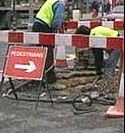Wandsworth Bids For Roadwork Relief Pilot
Welcoming plans that allow councils to charge for digging up busy roads at peak times
Councillors want the borough's congestion hotspots - which suffer from regular and extended roadwork disruption - to be the first areas in the country to introduce the charging system.
The Department for Transport’s (DfT) proposed ‘lane rental’ scheme is designed to encourage utility firms to carry out work at times when the roads are at their quietist and to finish faster.
 Council leader Ravi Govindia said:
Council leader Ravi Govindia said:
“A financial incentive is the only way to ensure gas, water and other companies minimise the disruption their work causes to road users. These are profit driven businesses and our control systems must reflect that.
“Wandsworth has some of the capital’s worst congestion hotspots and the delays drivers endure are seriously exacerbated by long-lasting roadworks. Putney’s road network in particular has suffered from a series of major projects over the last two years which cut off small businesses on the Upper Richmond Road for months at a time.
These pinch points – which include council managed roads as well as TfL’s red routes – would make ideal test areas for the scheme and we are urging the Transport Secretary and the Mayor to include them in the scheme’s pilot.”
The Department for Transport has published a consultation and draft guidance to councils outlining how lane rental schemes could be implemented.
Local councils will need to propose charge levels that are appropriate to their individual circumstances. In particular, they will need to show that their charges are proportionate to the costs imposed by works on the roads in question. This is subject to a proposed maximum charge of £2,500 per day.
Transport Secretary Philip Hammond said:
"Everyone knows how frustrating it can be when you are sat in a traffic jam, unable to get to work or drop off the children at school because someone is digging up the road. This disruption is expensive as well as inconvenient, with one estimate valuing the loss to the economy from road works congestion at £4 billion a year. We simply cannot afford this.
"That is why I am putting forward proposals which would incentivise utility companies and local authorities to carry out their works at times when they will cause the minimum disruption to the travelling public.”
In order to gather evidence on the effectiveness of lane rental, the Department has proposed that schemes should initially be used in one urban and one non-metropolitan area.
The proposals are clear that lane rental charges must be avoidable and proportionate to the costs of congestion. Any revenue raised from the implementation of lane rental charges would be used by councils to fund measures which could help to reduce future road works disruption. This could include infrastructure work, research or measures to improve the management of works.
The DfT consultation will close on 31st October 2011.
September 2, 2011
Related links
|
